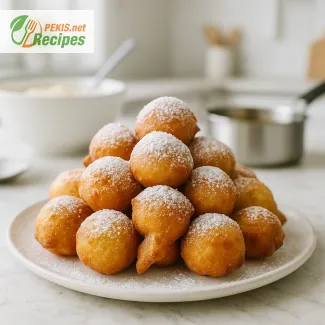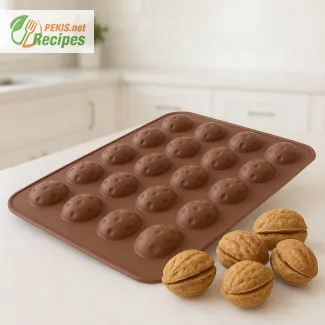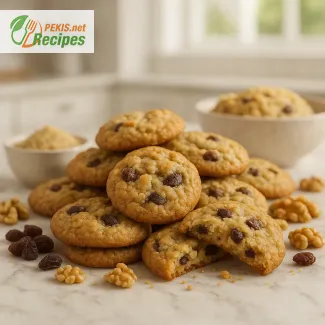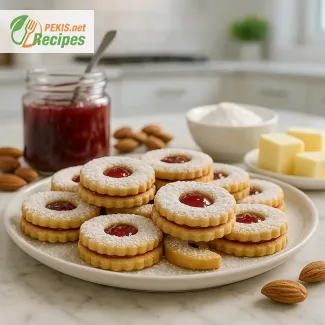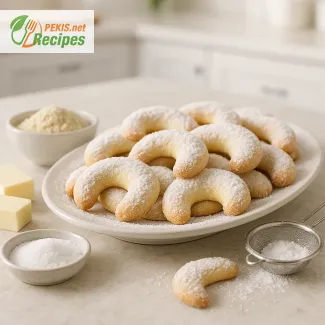Soft gingerbread with cinnamon yields about 20 cookies, ready in just 20 minutes prep, 12 minutes bake, and a total of 32 minutes. Made with honey, brown sugar, butter, and warm spices, these cookies are tender inside with lightly crisp edges. They keep at room temperature for 2 days, can be frozen for 2 months, and reheat at 150 °C for 8–10 minutes. Perfect for festive gifting, simple decoration, or enjoying with tea or coffee.
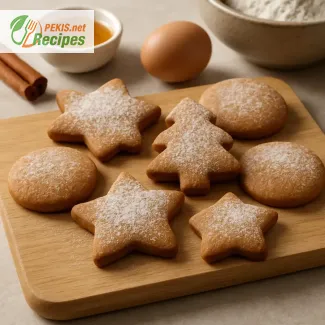
Aromatic gingerbread delicacy with cinnamon and honey
Traditional flavors in a modern baking interpretation
Soft, fragrant gingerbread infused with cinnamon and sweetened with golden honey brings together warmth, tradition, and irresistible texture. The balance between the spiced aroma of cinnamon and the natural sweetness of honey creates cookies that are both comforting and elegant, ideal for festive occasions or as a year-round indulgence. Their tender structure makes them melt-in-the-mouth, while the subtle crispness around the edges gives a satisfying bite.
Historical roots and cultural background
Gingerbread has a rich history that spans centuries, with origins tracing back to medieval Europe where honey and spices symbolized wealth and celebration. Over time, each region added its own unique twist: in Germany, Lebkuchen became a Christmas staple, while in Scandinavia, pepperkaker gained popularity. Cinnamon, once a rare luxury, turned gingerbread into a symbol of festivity and hospitality. Today, the combination of honey and cinnamon continues to be cherished, offering both nostalgic tradition and contemporary versatility.
Why you will love these gingerbread cookies
- Fragrant aroma of cinnamon that fills the kitchen while baking
- Soft and tender texture that contrasts with the slight crisp edges
- Natural sweetness of honey that deepens flavor without being overwhelming
- Timeless tradition tied to holidays, celebrations, and cozy family moments
- Versatility in shaping, decorating, or enjoying plain with tea or coffee
Core ingredients and their impact
The soul of these cookies lies in cinnamon and honey. Cinnamon provides the warm, spicy fragrance that lingers long after the first bite, while honey adds both sweetness and moisture, giving the dough a supple, pliable texture. Flour builds the structure, creating a sturdy yet soft base that holds shape even when cut into intricate forms. Butter or oil contributes richness and tenderness, while eggs help bind everything together, creating stability. The subtle addition of baking soda or powder ensures just enough lift, balancing lightness and density.
Creative variations with flavor twists
- Add a pinch of ground cloves or nutmeg for deeper, more complex spice notes
- Dip cooled cookies in dark chocolate for an elegant finish
- Use orange zest in the dough for a refreshing citrus accent
- Roll cookies in powdered sugar before baking for a snowy, festive look
- Create filled versions by sandwiching two cookies with apricot jam or spiced buttercream
Storage and make-ahead tips
- Room temperature: Store in an airtight container for up to 2 days to maintain softness
- Freezing: Freeze baked cookies for up to 2 months; thaw at room temperature
- Reheating: Warm gently in the oven at 150 °C (300 °F) for 8–10 minutes to restore freshness
Serving ideas and modern uses
These cinnamon gingerbread cookies are perfect for gifting, wrapping beautifully in cellophane or tins, and they keep their aroma well. They can be decorated with royal icing or simply dusted with sugar for a rustic look. Their softness makes them suitable for pairing with mulled wine, hot cocoa, or tea, and they can also be used as edible bases for desserts like cheesecakes or trifles.
Culinary entities and associations
Gingerbread is often linked to Christmas markets, festive tables, family traditions, and regional bakeries. Cinnamon connects the cookies to the wider category of spiced baked goods, while honey ties them to natural sweeteners and traditional desserts that emphasize wholesome flavor. These cookies embody the intersection of heritage, comfort, and creativity, making them a timeless delight for every generation.
PEKIS – professional chef and recipe developer with over 25 years of experience in cooking and baking, specializing in European and international cuisine. I’ve been perfecting gingerbread with cinnamon for decades, testing different balances of honey, spices, and flour to achieve the ideal softness with just the right hint of crisp edges. My approach focuses on keeping the flavor authentic while making the method simple enough for anyone to recreate at home, whether for holidays, family gatherings, or a quiet evening treat.
- In a medium bowl, combine flour, baking powder, baking soda, salt, cinnamon, ginger, and cloves. Mix well to evenly distribute the spices.
- In a large mixing bowl, cream the softened butter with brown sugar until light and fluffy. Add the egg, honey, and vanilla extract, then beat until smooth.
- Gradually add the dry mixture into the wet ingredients, mixing until a soft dough forms. If the dough feels sticky, chill it in the refrigerator for 30 minutes.
- Roll the dough on a lightly floured surface to about 5 mm (¼ inch) thickness. Use cookie cutters to shape the dough as desired.
- Place the cookies on a baking tray lined with parchment paper, leaving some space between them.
- Bake in a preheated oven at 180 °C (350 °F) for 10–12 minutes until edges are lightly golden.
- Allow to cool on a wire rack, then dust with powdered sugar (for decoration).
FAQ questionHow do I keep gingerbread with cinnamon soft?
Aim for 5 mm thickness, bake at 180 °C for 10–12 minutes, and pull them when edges are lightly golden—not brown. Overbaking drives off moisture and hardens the crumb. Use honey (it’s hygroscopic) to retain softness, and cool on a rack before storing in an airtight container. If they firm up, add a small slice of bread or apple to the tin for overnight moisture recovery.
FAQ questionCan I replace honey with sugar or maple syrup?
Yes, but expect flavor and texture shifts. Maple syrup keeps cookies tender but tastes less floral; dark molasses gives deeper color and a chewier bite. If swapping honey 1:1, check dough feel: if it’s looser, add 1–2 tbsp flour; if stiffer, add 1–2 tsp milk. Avoid all-white sugar alone; combine with a moist sweetener to preserve soft texture.
FAQ questionWhat flour works best for soft gingerbread cookies?
Use all-purpose flour for balanced structure. Too much protein (bread flour) makes cookies tough; too little (cake flour) can cause spreading. Measure accurately and sift with spices so cinnamon and leaveners distribute evenly, which supports a tender crumb and consistent rise.
FAQ questionHow much cinnamon should I use for a balanced flavor?
For about 400 g flour, start with 10 g cinnamon, 5 g ginger, and 2 g cloves. This ratio creates a cinnamon-forward profile with warm complexity. Prefer freshly ground spices or recently opened jars—volatile oils fade over time, dulling aroma. For a brighter note, add orange zest; for depth, a pinch of nutmeg.
FAQ questionWhy does the dough crack or spread?
Cracks usually mean dry dough or edges overbaked; add 1–2 tsp milk to the dough and reduce bake time slightly. Spreading comes from warm dough, low flour, or over-creamed butter. Fix by chilling the dough 30–45 minutes, rolling to 5 mm, using parchment (not greased pans), and placing cutouts on cool trays. Calibrate your oven—hot spots can exaggerate spread.
FAQ questionCan I make gluten-free or egg-free gingerbread?
For gluten-free, use a 1:1 gluten-free blend with xanthan gum, then chill longer to help shaping. Expect slightly less snap but good softness if honey is retained. For egg-free, try a flax egg (1 tbsp ground flax + 3 tbsp water) or unsweetened applesauce (2–3 tbsp) for binding. Keep the bake short to maintain tender centers.
FAQ questionHow should I store, freeze, and reheat gingerbread?
Store in an airtight tin at room temperature for 2 days. Freeze baked cookies up to 2 months—layer with baking paper to protect decorations. Reheat at 150 °C for 8–10 minutes to refresh aroma and soften the crumb. Undecorated cookies freeze best; add powdered sugar or royal icing after thawing for a clean finish.
Soft, fragrant gingerbread with cinnamon brings together the essence of festive baking in every bite. The natural sweetness of honey, paired with warm spices, creates cookies that are tender at the center with golden edges. Their balanced texture makes them a timeless choice for gatherings, celebrations, or simply as a treat with tea or coffee.
The combination of cinnamon, ginger, and cloves ensures an aroma that lingers long after baking, turning the kitchen into a space filled with comfort and tradition. Every detail, from the choice of flour to the use of honey, contributes to a result that feels both classic and fresh. These cookies carry a cultural heritage yet remain adaptable to modern tastes and dietary needs.
Beyond their flavor, the cookies stand out for their versatility. They can be left plain with a dusting of powdered sugar, decorated with icing for festive occasions, or even paired with other desserts. Their ability to stay soft while also freezing well makes them practical for preparing in advance and enjoying later without losing quality.
What makes these gingerbread cookies with cinnamon truly special is how they embody comfort and creativity in equal measure. They serve as a link between tradition and personal expression, offering both familiar flavors and endless opportunities to adapt them for different occasions. Each batch brings back memories while creating new ones, making them more than just cookies—they are part of a shared culinary story.
Allergens present in the recipe:
- Gluten (from flour)
- Eggs
- Milk (from butter)
Substitution tips to avoid allergens:
- Replace all-purpose flour with gluten-free flour mix to make cookies gluten-free.
- Use plant-based margarine instead of butter to avoid milk allergens.
- Substitute egg with flaxseed meal mixed with water or unsweetened applesauce.
- Vitamin B2 (0.04 mg) – supports energy metabolism
- Vitamin B6 (0.05 mg) – important for nervous system health
- Vitamin E (0.2 mg) – contributes to cell protection
- Calcium (12 mg) – supports bone health
- Iron (1 mg) – essential for oxygen transport in blood
- Magnesium (8 mg) – supports muscle function
- Potassium (85 mg) – helps regulate fluid balance
- Phosphorus (22 mg) – important for teeth and bones
- Polyphenols from honey (15 mg) – contribute to reducing oxidative stress
- Cinnamaldehyde from cinnamon (8 mg) – supports anti-inflammatory functions
- Gingerol from ginger (5 mg) – beneficial for digestion and immunity
- Flavonoids from cloves (6 mg) – may improve circulation and protect cells
